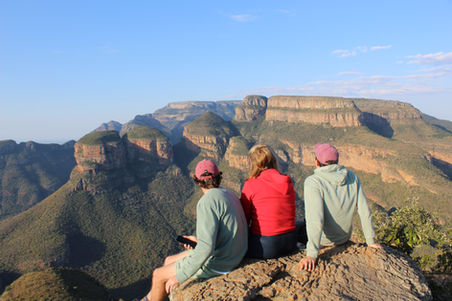top of page


























FAQs and other helpful information
What to bring
Activities
Food and Drink
Accomodation
Behaviour and Ethics
Health and Safety
Visa's and Imigration
Flights and Booking Requirments
Field Guiding Course
Community Volunteer
Here’s a few ideas of what Hamba Africa feels you should bring along, to help you have the best time possible.
We will of course provide any essential tools and equipment needed for all of our activities, but there are still a few things you should bring yourself.
You'll also be getting a checklist with your booking to give you more suggestions.
The temperature in South Africa typically is 15-35°C in the summer (September to April), and 5–25°C in winter (March to August). Although is probably going to be a lot hotter than most who will be joining us will be used to, it is still essential to bring clothes that you can wear during the evening and night when the temperature does drop.
We recommend bringing layers, as morning activities can begin before the morning sun has had a chance to warm everyone up. By early afternoon it will most likely be very hot, so clothing you can put on and take off quickly is best.
For activities and projects we will want to try to blend into the bush as much as possible. Khakis, greens and beiges are best for this!
During bush work or hikes and long walks, jeans or leggings are not advisable as they could begin to chafe. Combat trousers or other forms of outdoorsy trousers are ideal.
A backpack is also a good addition for certain activities.
Outside of activities, feel free to bring and wear whatever you like; shorts, trousers, dresses! Bear in mind you will want to be comfy, especially for long drives in game vehicles!
Also - don’t forget your swimwear!
The temperature in South Africa typically is 15-35°c in the summer (September to March), and 5–25°c in winter (April to August). However, bring warm clothes that you can wear during the evening and at night-time when the temperature drops.
We recommend bringing layers, as activities that begin early mean starting before the morning sun has had a chance to warm everyone up. By early afternoon it will most likely be very hot, so clothing that you can put on and take off quickly is best.
For activities and projects we recommend wearing comfortable and casual clothing that you are happy to work in..
During bush work or long walks, jeans or leggings are not advisable as they could begin to chafe. Combat trousers or other forms of outdoor wear are ideal.
Closed shoes with a flat sole, such as trainers, are essential. Hiking or work boots are advisable. No high heels!
Owing to health and safety issues, anyone without closed shoes will not be permitted to take part in activities that focus on exploring the bush. The bush has many thorny plants - attempting to explore in sandals or flip flops could prove a painful experience.
For leisure time, feel free to bring and wear whatever shoes you like - sandals / flip flops are always a good idea for hot days and relaxing by the pool.
Although the trip is all inclusive, we still recommend bringing some extra travel money.
This will be needed for trips into town, and any toiletries, luxuries or souvenirs you may wish to buy. It will also help for any optional meals and during your free days, where you can partake in any extra and optional activities.
There are ATM facilities throughout the area but please remember to notify your bank prior to traveling. Alternatively, register for a Post Office pre-paid travel card which you can top up in the local currency before you leave.
During some of our conservation projects we will be recording findings and data - having your own notepad for your own records and observations can prove useful. It can also be nice to keep a diary of your experiences!
Binoculars
Camera’s
Go pro’s / Action cameras
Books
Cards
Board Games
Phones
Music Players
Bug Spray
Multi-tools
Torches
Water bottles
Please bring your own towels, toiletries and bathing supplies. You will have an opportunity to re-stock these periodically on the weekends.
You will be sent a full description of all the equipment you will need and a comprehensive kit list for your trip when your booking has been confirmed.
bottom of page